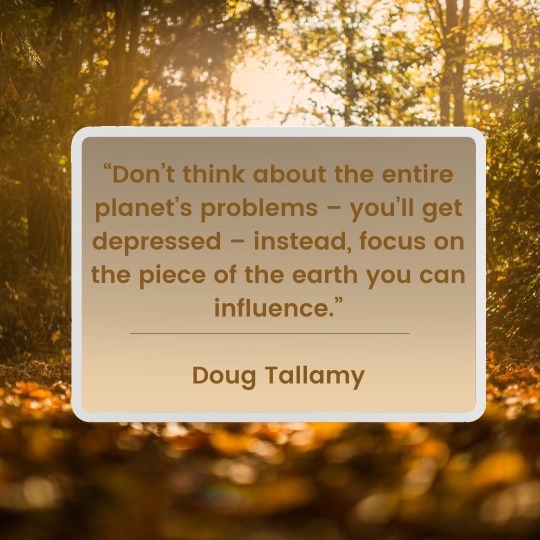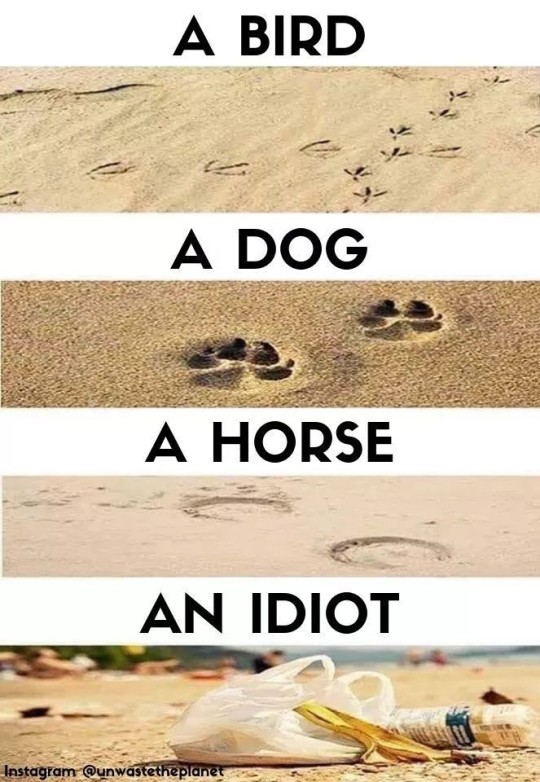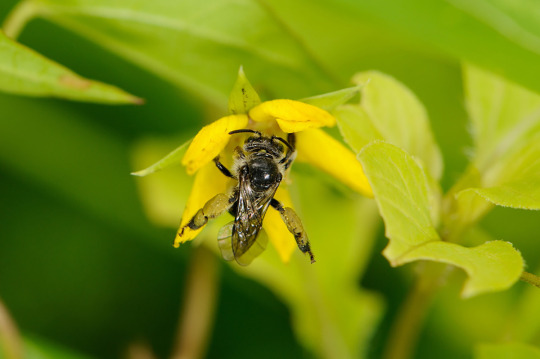#saving the environment
Explore tagged Tumblr posts
Text
AI could write and draw better than me, but im still not gonna use it 🚫
I can write bad fanfiction without wasting any water
2 notes
·
View notes
Text

I'm so glad Doug said this because this is exactly how I see the world these days.
#nature#environment#pollinators#usa native plants#native plants#save the bees#midwest#birds#homegrown national park#backyard wildlife#doug tallamy#saving the environment#environmental destruction#climate disruption#climate change
27 notes
·
View notes
Text

The HORG website had this cool four part image about the new efforts to make recyclable bread tags. M talks about this in the episode, but I wanted to show off these guys as I think they are an awesome step forward into a more sustainable future. Previously, they were all made of plastic and had been swallowed and harmed some people, which M addresses in the episode, and the cardboard is just better for the environment.
To hear M talk about all these issues on the podcast, click the link below to get the resources and the full episode.
Small Sciences: Occlupanology
#sustainability#that's where it's at#saving the environment#one bread tag at a time#podcast#wwyat#weird science#strange collections
2 notes
·
View notes
Note
hey girlies i can be your pad and tampon sugar mommy 😘🫰
(currently breaking rule one)
-🐀
i use a menstrual cup, what now
5 notes
·
View notes
Text
Sharing incase you're interested
Planet's Fucked: What Can You Do To Help? (Long Post)
Since nobody is talking about the existential threat to the climate and the environment a second Trump term/Republican government control will cause, which to me supersedes literally every other issue, I wanted to just say my two cents, and some things you can do to help. I am a conservation biologist, whose field was hit substantially by the first Trump presidency. I study wild bees, birds, and plants.
In case anyone forgot what he did last time, he gagged scientists' ability to talk about climate change, he tried zeroing budgets for agencies like the NOAA, he attempted to gut protections in the Endangered Species Act (mainly by redefining 'take' in a way that would allow corporations to destroy habitat of imperiled species with no ramifications), he tried to do the same for the Migratory Bird Treaty Act (the law that offers official protection for native non-game birds), he sought to expand oil and coal extraction from federal protected lands, he shrunk the size of multiple national preserves, HE PULLED US OUT OF THE PARIS CLIMATE AGREEMENT, and more.
We are at a crucial tipping point in being able to slow the pace of climate change, where we decide what emissions scenario we will operate at, with existential consequences for both the environment and people. We are also in the middle of the Sixth Mass Extinction, with the rate of species extinctions far surpassing background rates due completely to human actions. What we do now will determine the fate of the environment for hundreds or thousands of years - from our ability to grow key food crops (goodbye corn belt! I hated you anyway but), to the pressure on coastal communities that will face the brunt of sea level rise and intensifying extreme weather events, to desertification, ocean acidification, wildfires, melting permafrost (yay, outbreaks of deadly frozen viruses!), and a breaking down of ecosystems and ecosystem services due to continued habitat loss and species declines, especially insect declines. The fact that the environment is clearly a low priority issue despite the very real existential threat to so many people, is beyond my ability to understand. I do partly blame the public education system for offering no mandatory environmental science curriculum or any at all in most places. What it means is that it will take the support of everyone who does care to make any amount of difference in this steeply uphill battle.
There are not enough environmental scientists to solve these issues, not if public support is not on our side and the majority of the general public is either uninformed or actively hostile towards climate science (or any conservation science).
So what can you, my fellow Americans, do to help mitigate and minimize the inevitable damage that lay ahead?
I'm not going to tell you to recycle more or take shorter showers. I'll be honest, that stuff is a drop in the bucket. What does matter on the individual level is restoring and protecting habitat, reducing threats to at-risk species, reducing pesticide use, improving agricultural practices, and pushing for policy changes. Restoring CONNECTIVITY to our landscape - corridors of contiguous habitat - will make all the difference for wildlife to be able to survive a changing climate and continued human population expansion.
**Caveat that I work in the northeast with pollinators and birds so I cannot provide specific organizations for some topics, including climate change focused NGOs. Scientists on tumblr who specialize in other fields, please add your own recommended resources. **
We need two things: FUNDING and MANPOWER.
You may surprised to find that an insane amount of conservation work is carried out by volunteers. We don't ever have the funds to pay most of the people who want to help. If you really really care, consider going into a conservation-related field as a career. It's rewarding, passionate work.
At the national level, please support:
The Nature Conservancy
Xerces Society for Invertebrate Conservation
Cornell Lab of Ornithology (including eBird)
National Audubon Society
Federal Duck Stamps (you don't need to be a hunter to buy one!)
These first four work to acquire and restore critical habitat, change environmental policy, and educate the public. There is almost certainly a Nature Conservancy-owned property within driving distance of you. Xerces plays a very large role in pollinator conservation, including sustainable agriculture, native bee monitoring programs, and the Bee City/Bee Campus USA programs. The Lab of O is one of the world's leaders in bird research and conservation. Audubon focuses on bird conservation. You can get annual memberships to these organizations and receive cool swag and/or a subscription to their publications which are well worth it. You can also volunteer your time; we need thousands of volunteers to do everything from conducting wildlife surveys, invasive species removal, providing outreach programming, managing habitat/clearing trails, planting trees, you name it. Federal Duck Stamps are the major revenue for wetland conservation; hunters need to buy them to hunt waterfowl but anyone can get them to collect!
THERE ARE DEFINITELY MORE, but these are a start.
Additionally, any federal or local organizations that seek to provide support and relief to those affected by hurricanes, sea level rise, any form of coastal climate change...
At the regional level:
These are a list of topics that affect major regions of the United States. Since I do not work in most of these areas I don't feel confident recommending specific organizations, but please seek resources relating to these as they are likely major conservation issues near you.
PRAIRIE CONSERVATION & PRAIRIE POTHOLE WETLANDS
DRYING OF THE COLORADO RIVER (good overview video linked)
PROTECTION OF ESTUARIES AND SALTMARSH, ESPECIALLY IN THE DELAWARE BAY AND LONG ISLAND (and mangroves further south, everglades etc; this includes restoring LIVING SHORELINES instead of concrete storm walls; also check out the likely-soon extinction of saltmarsh sparrows)
UNDAMMING MAJOR RIVERS (not just the Colorado; restoring salmon runs, restoring historic floodplains)
NATIVE POLLINATOR DECLINES (NOT honeybees. for fuck's sake. honeybees are non-native domesticated animals. don't you DARE get honeybee hives to 'save the bees')
WILDLIFE ALONG THE SOUTHERN BORDER (support the Mission Butterfly Center!)
INVASIVE PLANT AND ANIMAL SPECIES (this is everywhere but the specifics will differ regionally, dear lord please help Hawaii)
LOSS OF WETLANDS NATIONWIDE (some states have lost over 90% of their wetlands, I'm looking at you California, Ohio, Illinois)
INDUSTRIAL AGRICULTURE, esp in the CORN BELT and CALIFORNIA - this is an issue much bigger than each of us, but we can work incrementally to promote sustainable practices and create habitat in farmland-dominated areas. Support small, local farms, especially those that use soil regenerative practices, no-till agriculture, no pesticides/Integrated Pest Management/no neonicotinoids/at least non-persistent pesticides. We need more farmers enrolling in NRCS programs to put farmland in temporary or permanent wetland easements, or to rent the land for a 30-year solar farm cycle. We've lost over 99% of our prairies to corn and soybeans. Let's not make it 100%.
INDIGENOUS LAND-BACK EFFORTS/INDIGENOUS LAND MANAGEMENT/TEK (adding this because there have been increasing efforts not just for reparations but to also allow indigenous communities to steward and manage lands either fully independently or alongside western science, and it would have great benefits for both people and the land; I know others on here could speak much more on this. Please platform indigenous voices)
HARMFUL ALGAL BLOOMS (get your neighbors to stop dumping fertilizers on their lawn next to lakes, reduce agricultural runoff)
OCEAN PLASTIC (it's not straws, it's mostly commercial fishing line/trawling equipment and microplastics)
A lot of these are interconnected. And of course not a complete list.
At the state and local level:
You probably have the most power to make change at the local level!
Support or volunteer at your local nature centers, local/state land conservancy non-profits (find out who owns&manages the preserves you like to hike at!), state fish & game dept/non-game program, local Audubon chapters (they do a LOT). Participate in a Christmas Bird Count!
Join local garden clubs, which install and maintain town plantings - encourage them to use NATIVE plants. Join a community garden!
Get your college campus or city/town certified in the Bee Campus USA/Bee City USA programs from the Xerces Society
Check out your state's official plant nursery, forest society, natural heritage program, anything that you could become a member of, get plants from, or volunteer at.
Volunteer to be part of your town's conservation commission, which makes decisions about land management and funding
Attend classes or volunteer with your land grant university's cooperative extension (including master gardener programs)
Literally any volunteer effort aimed at improving the local environment, whether that's picking up litter, pulling invasive plants, installing a local garden, planting trees in a city park, ANYTHING. make a positive change in your own sphere. learn the local issues affecting your nearby ecosystems. I guarantee some lake or river nearby is polluted
MAKE HABITAT IN YOUR COMMUNITY. Biggest thing you can do. Use plants native to your area in your yard or garden. Ditch your lawn. Don't use pesticides (including mosquito spraying, tick spraying, Roundup, etc). Don't use fertilizers that will run off into drinking water. Leave the leaves in your yard. Get your school/college to plant native gardens. Plant native trees (most trees planted in yards are not native). Remove invasive plants in your yard.
On this last point, HERE ARE EASY ONLINE RESOURCES TO FIND NATIVE PLANTS and LEARN ABOUT NATIVE GARDENING:
Xerces Society Pollinator Conservation Resource Center
Pollinator Pathway
Audubon Native Plant Finder
Homegrown National Park (and Doug Tallamy's other books)
National Wildlife Federation Native Plant Finder (clunky but somewhat helpful)
Heather Holm (for prairie/midwest/northeast)
MonarchGard w/ Benjamin Vogt (for prairie/midwest)
Native Plant Trust (northeast & mid-atlantic)
Grow Native Massachusetts (northeast)
Habitat Gardening in Central New York (northeast)
There are many more - I'm not familiar with resources for western states. Print books are your biggest friend. Happy to provide a list of those.
Lastly, you can help scientists monitor species using citizen science. Contribute to iNaturalist, eBird, Bumblebee Watch, or any number of more geographically or taxonomically targeted programs (for instance, our state has a butterfly census carried out by citizen volunteers).
In short? Get curious, get educated, get involved. Notice your local nature, find out how it's threatened, and find out who's working to protect it that you can help with. The health of the planet, including our resilience to climate change, is determined by small local efforts to maintain and restore habitat. That is how we survive this. When government funding won't come, when we're beat back at every turn trying to get policy changed, it comes down to each individual person creating a safe refuge for nature.
Thanks for reading this far. Please feel free to add your own credible resources and organizations.
19K notes
·
View notes
Text
If you use arab.org like I do please consider taking the extra 30-60 seconds to click on ALL of their causes. Palestine is important but so are the environment, refugees, children, women, and the impoverished across the middle east and it doesn't take away from Palestine to click for multiple causes. The arab world faces a lot of problems and they only get worsened by how western nations have oppressed and attacked them. Clicking is small but it generates something and overtime it does benefit the greater good. It takes all of us clicking as often as possible but we can do it! It's really easy and safe and they have proofs on their site on how they do make an impact and are donating your click money
#arab.org#palestine#save palestine#free palestine#gaza#gaza strip#free gaza#save gaza#middle east#arab#please if you can't donate to causes use this site#its safe its free and anyone can use it#just turn off ur adblocker#for arab.org only#women's rights#save the children#help the poor#save the environment#help refugees#click to help
37K notes
·
View notes
Text



some recent stuff i've done in magma bc im kind of addicted to using it lol
#gravity falls#stanley pines#stan pines#grunkle stan#stanford pines#ford pines#grunkle ford#gravity falls fanart#fanart#disney#environment/lighting studies/experiments in magma save.....#i seriously can't stop doing them bruh i'm going crazy 😭😭#i just got magma premium yesterday bc i was running out of space on my account LOL#anyway yeahhhh hope u like#mods art#mods draws#my art
9K notes
·
View notes
Text
sometimes things are bad. but sometimes, you see somebody in front of you on the outside steps stomp down on something, then see an invasive species of bug fly down a step only for someone right in front of you stomp it again, and you stomp it once more for good measure. and things are good.
0 notes
Text
I LOVE YOU BLOGGER!

#environment#appetite for destruction#photography#nature#humanity#saving our beaches#saving the environment
164 notes
·
View notes
Text



Source
#environmentalism#save the bees#bees#current events#important#climate change#climate crisis#environment#news
1K notes
·
View notes
Text

@Joan_de_art
#solarpunk#cottagepunk#ecopunk#it takes a village#environmentallyfriendly#environmental impact#save the environment#enviromentalism#environmentalism#environmental justice#environmental conservation#eco goth#eco friendly living#eco friendly#ecofriendly#sustainableliving#sustainable living#sustainability#sustainable#sustainable lifestyle#sustainable landscaping#stay at home mom#housewife#homemaker#homemaking#sahm#hippie mom#futuristic#futurism#solar punk
736 notes
·
View notes
Text
This is a link to my music on SoundCloud.com. If you like it, please leave a like, a comment, a repost, a follow. Thank you and Enjoy.
#soundcloud#music#joeyboy1970#reydangaspar#djreydan#mixed music#environmentalism#saving the environment
0 notes
Text
There is so much we don't understand. Springtime, out in the meadow. Everybody all over the dandelions--- flies, ants, tiny bees, even tinier bees so minuscule they're like black and jewel-colored particles without a closer look.
Get down on hands and knees--- you start to see the world. The tiny bees, a glittering blue-green color, slide down between the pollen-coated anthers of the dandelions into the crevices of the petals like miners sliding down into narrow shafts. The big bees make it look so simple. For the tiniest bees, a dandelion is a place more than it is a food. The bee's body is sleek like a suit of armor, and solidly shiny blue-green instead of having the distinctive stripes of many other bees.
Can I learn the name of this bee? To see the bee and to know it, you have to look very silly lying on the ground among the dandelions, looking closely at the things too small to be important. It is a mere particle, just a Bug, rather than a stereotypical fluffy yellow and black bee. It is complex and beautiful; its metallic and glittering exoskeleton, its transparent wings, its articulated and sensitive antennae.
"We have to save the bees, they are important," people say, but if we don't look closely, who is to say what is a bee and what isn't? And when we do look closely, isn't everything important?
877 notes
·
View notes
Text
CA Redwoods to Be First National Park Co-Managed with a Native American Tribe That Used to Own it https://www.goodnewsnetwork.org/ca-redwoods-to-be-the-first-national-park-co-managed-with-a-native-american-tribe-that-used-to-own-it/
questionable headline aside this is good news
The Yurok will be the first Tribal nation to co-manage land with the National Park Service under a historic memorandum of understanding signed on Tuesday by the tribe, Redwood national and state parks, and the non-profit Save the Redwoods League, according to news reports.
The Yurok tribe has seen a wave of successes in recent years, successfully campaigning for the removal of a series of dams on the Klamath River, where salmon once ran up to their territory, and with the signing of a new memorandum of understanding, the Yurok are set to reclaim more of what was theirs.
#good news#environmentalism#science#canada#redwoods#yurok#save the redwoods league#not really land back#but still a good step#nature#stewardship#indigenous#indigenous land stewardship#environment#conservation#animals#trees#forests
3K notes
·
View notes
Text










Lord Hans Capon of Pirkstein
{slaying, shooting and casually dodging his way through life}
bonus:


#kingdom come deliverance#hans capon#kcd#kcd2#my gifs#i felt we don‘t give this boy enough credit for his fighting skills#like being called zizka‘s most talented marksman — by zizka himself!#whirlwinding through rows of enemies and saving henry‘s arse a dozen times in the meantime#and missing a shot to the fucking face with his reflexes not once but twice! legend.#also can we talk about how he utilises his whole body and environment to fight? our lord grew up as a feral street cat and it shows
496 notes
·
View notes
Text

Xerces Society: Announcing The State Of The Bees Initiative: Our Plan To Study Every Wild Bee Species In The U.S.
This is really exciting news! For those unaware, the Xerces Society has been focusing on invertebrate conservation for over fifty years, and has pioneered a lot of the work to bring awareness to the devastating losses of not only insects but other terrestrial and aquatic invertebrates. It gets its name from the Xerces blue butterfly (Glaucopsyche xerces), the first North American butterfly driven to extinction by human activities.
Even if you haven't heard of the Xerces Society, you've probably come across various "Save the Bees!" campaigns. These frequently focus on the domesticated European honey bee (Apis mellifera), which, while it may be important to crop pollination in many parts of the world, is not a part of natural ecosystems in places like the Americas and Australia, and can be considered an invasive species at times. With the rise of colony collapse disorder (CCD) particularly after the turn of the 21st century, where entire domestic honeybee colonies would die off, the need to preserve bees began to gain wider public acknowledgement.
But what many people don't realize is that it is the thousands upon thousands of other native bee species worldwide that are in greater danger of extinction. They don't have armies of beekeepers giving them safe places to live and treating them for diseases and parasites. More importantly, where honey bees may visit a wide variety of plants, native bees often have a much narrower series of species they visit, and they are quite vulnerable to habitat loss. Most bees are not as social as honey bees and live solitary lives, unseen by the casual observer.
Invertebrates in general often suffer from a lack of conservation information, meaning that particularly vulnerable species may fly under the radar and risk going extinct without anyone realizing until it's too late. This ambitious program by the Xerces Society aims to solve that problem, at least for the 3,600+ species of bee in the United States. If they can assign a conservation status to each one, then that strengthens the argument toward protecting their wild habitats and working to increase their numbers. Hopefully it will also prompt more attention to other under-studied species that are in danger of going extinct simply because we don't know enough about them.
#bees#save the bees#invertebrates#arthropods#insects#entomology#nature#wildlife#animals#ecology#environment#conservation#science#scicomm#endangered species#extinction#pollinators#Xerces Society#Xerces blue
599 notes
·
View notes